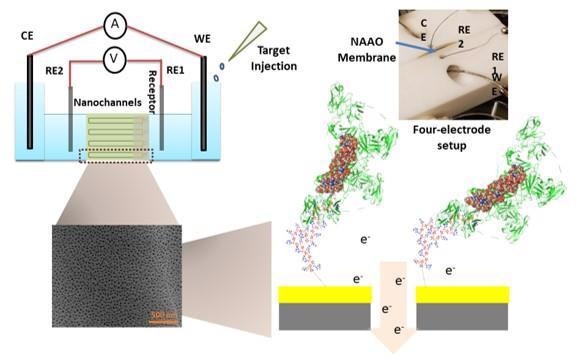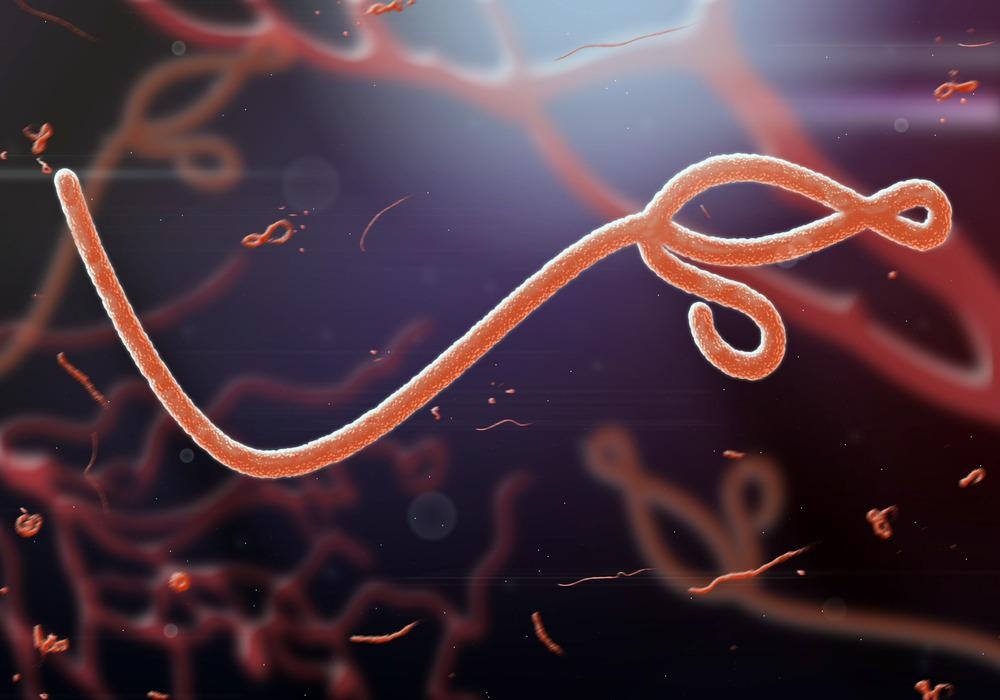Apr 28 2021
Scientists have been developing a new sensor with the ability to detect Ebola in a single drop of blood and offer results within an hour.
 Ebola biomarkers are exposed to an aptamer-coated aluminum oxide membrane. Binding of biomarkers to the aptamer-covered surface sets off a change in transmembrane impedance that is registered by sensors, shown here as four electrodes. Image Credit: Marit Nilsen-Hamilton and Pranav Shotriya, Iowa State University.
Ebola biomarkers are exposed to an aptamer-coated aluminum oxide membrane. Binding of biomarkers to the aptamer-covered surface sets off a change in transmembrane impedance that is registered by sensors, shown here as four electrodes. Image Credit: Marit Nilsen-Hamilton and Pranav Shotriya, Iowa State University.
Further advancement could enable the technology to offer quick and economical detection of other viruses, such as the virus that causes COVID-19.
Ebola is one of the most lethal of all known viruses, destroying up to 90% of those infected. Blocking its spread necessitates quick detection and isolation of infected people. But outbreaks might occur in remote regions of Africa, which need blood tests to be shipped to faraway laboratories for analysis. This results in considerable delays in detecting a new outbreak.
The research will be presented at the American Society for Biochemistry and Molecular Biology annual meeting during the virtual Experimental Biology (EB) 2021 meeting, scheduled from April 27th to 30th, by Soma Banerjee, PhD, a visiting scientist in Marit Nilsen-Hamilton’s laboratory at Iowa State University, research associate in Ames National Laboratory, and research scientist at Aptalogic Inc.
The new sensor is being created by a team of researchers headed by Nilsen-Hamilton, who is also a chief scientific officer of Aptalogic Inc., and Pranav Shotriya from Iowa State University.
The study involves a multidisciplinary effort involving researchers with expertise in molecular biology, virology, mechanical engineering, and bioinformatics from the University of Iowa, Iowa State University, and the National Center for Biotechnology Information, part of the National Institutes of Health’s National Library of Medicine.
The basis for the Ebola sensor is DNA aptamers—single-stranded, short DNA molecules that selectively attach to a particular target. For Ebola detection, the team found aptamers that attach to Ebola virus soluble glycoprotein, which is a protein that appears in the blood of a person infected with Ebola before symptoms appear.

Image Credit: jaddingt/Shutterstock.com
Existing techniques for detecting Ebola work based on analysis methods that necessitate trained individuals and laboratory facilities to carry out the tests. There are other alternative techniques, but they tend to be hard to read by personnel who wear protective gear or need special storage conditions.
Our new sensor doesn’t require any special storage conditions. This is an immense advantage because Ebola outbreaks occur frequently in remote areas where even electricity can be a luxury.
Soma Banerjee, Visiting Scientist, Marit Nilsen-Hamilton’s Laboratory, Iowa State University
To date, the team has demonstrated that the aptamers they chose function well on a portable nanoporous alumin oxide sensor. Moreover, they identified that the sensor can detect the Ebola glycoprotein in infected macaque blood serum, offering results comparable to the standard ELISA-based assay conducted using Ebola antibodies.
Once our device is fully optimized for detecting Ebola, we plan to develop a multiplexed version that can perform multiple tests and detect other viruses and microbes, all from one drop of blood. We’re also using what we’ve learned so far to identify aptamers that could be used to detect COVID-19 and other similar viruses.
Soma Banerjee, Visiting Scientist, Marit Nilsen-Hamilton’s Laboratory, Iowa State University
Now, the researchers are working to further minimize the one-hour testing time without any impact on the accuracy. In addition, they intend to render the sensor easier to use to enable results to be read by personnel without the need for any special training.
Source: https://experimentalbiology.org/